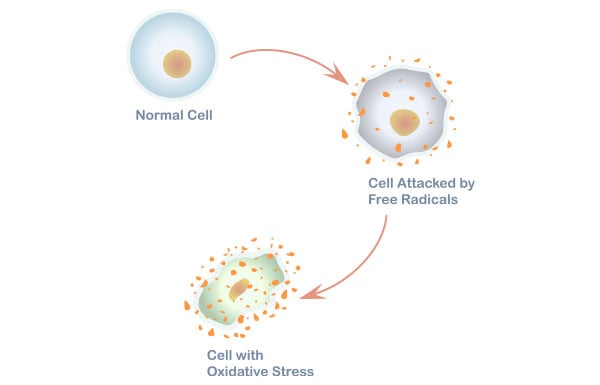All you need to know about Oxidative stress and Inflammation
Oxidative stress occurs due to an imbalance between reactive oxygen species (ROS) production and the protective system’s ability to detoxify these reactive products. It can cause damage to cells and tissues and can lead to chronic inflammation. Long-term oxidative stress can also cause conditions such as diabetes, cancer, and heart disease.
What is oxidative stress?
Oxidative stress is caused due to an imbalance between antioxidants and free radicals in the body. Free radicals are oxygen-containing molecules that have one or more unpaired electrons. Due to this uneven number of electrons, they easily bind with other molecules.
As free radicals readily react with other molecules, many chemical reactions take place in the body. These reactions are referred to as “oxidation”, and they can either benefit or harm your body.
The body’s cells produce free radicals and antioxidants. Antioxidants are molecules that can neutralise free radicals by donating an electron. As a result, the free radical becomes less reactive and stabilised.
Factors contributing to oxidative stress include:
• Food/diet
• Lifestyle
• Environmental factors such as pollution and radiation
The natural immune response can cause oxidative stress temporarily, further leading to mild inflammation. It goes away when the immunity strength of the body against the infection is increased.
Oxidative stress, if uncontrolled, can speed the process of ageing and lead to several other conditions.
Effects of oxidative stress
The effects of oxidative stress can be beneficial or harmful to the body, depending on the activities. For example, temporary oxidative stress resulting from exercise can be helpful for the body. It is also observed that mild oxidative stress is beneficial to avoid infections and diseases in the body.
Whereas, long-term oxidative stress can be harmful, causing damage to the proteins, cells, and DNA in the body. It can accelerate the ageing process and create conditions such as chronic inflammation and neurodegenerative diseases.

Oxidative stress plays a significant role in the ageing process. Uncontrolled oxidative stress damages the cells, proteins, and DNA which contributes to ageing and several other conditions. In such cases, oxidative stress can be treated using nutritional, environmental and pharmacological strategies.
Health conditions caused due to oxidative stress
Oxidative stress can cause several diseases that include:
• Diabetes
• Asthma
• Cancer
• Alzheimer’s disease
• Inflammatory disorders
• Cardiovascular conditions (Atherosclerosis, High blood pressure, and Stroke)
• Parkinson’s disease
Factors causing Oxidative stress
Long-term oxidative stress can be caused due to the following factors :
• Pollution
• Excessive intake of sugar and fats
• Alcohol consumption
• Obesity
• Exposure to industrial chemicals
• Exposure to radiation
How to prevent oxidative stress?
Both free radicals and antioxidants are essential requirements for the body. If they are unbalanced, it may cause several health problems. To avoid these conditions, follow proper diet and lifestyle measures that may reduce oxidative stress.
To prevent oxidative stress, it’s recommended to:
• Eat a balanced diet
• Practice exercise regularly
• Reduce stress
• Maintain a healthy body weight
• Limit the intake of foods high in sugars and fats
• Cut out alcohol consumption
• Avoid exposure to pollution and radiation
Nutrients for reducing oxidative stress
Foods high in antioxidants can help to combat and prevent oxidative stress. Your diet should include the following food:
• Spinach
• Pumpkin
• Pecans
• Beetroot
• Collard greens
• Cabbage
• Berries (strawberries, blueberries, raspberries)
• Broccoli
• Carrots
• Avocados
• Sweet potatoes
What is inflammation?
Inflammation is the process by which your body attempts to heal itself from infection, disease, and injury. It is produced by the immune system and plays a vital role in the healing process.
Inflammation is classified into two types:
Acute inflammation
Acute inflammation is a short-term process occurring in response to tissue injuries and can be resolved within a few hours or days. This is the redness, warmth, swelling, and pain around tissues and joints that occur in response to an injury, when you cut yourself for example. When the body is injured, your immune system releases white blood cells to surround and protect the area. In this type, your body can return to its previous state as soon as your injury has been treated.
Chronic inflammation
Chronic inflammation is a long-lasting form of inflammation. The immune system continuously releases white blood cells because it thinks it’s constantly injured. Its effect does not end when the injury or illness is healed. Conditions linked to chronic inflammation include cancer, diabetes, heart disease, Alzheimer’s disease, rheumatoid arthritis, and asthma.
What are the common symptoms of inflammation?
Short and long-term inflammations can affect your body in different ways. The symptoms include:
• Redness
• Joint pain
• Fatigue
• Headache
• Heat
• Loss of appetite
• Swollen joint
• Fever
• Muscle stiffness
• Loss of function
Causes of inflammation
Factors causing inflammations include:
• Exposure to certain irritants your body can’t eliminate easily
• Certain medications
• Acute and chronic conditions
Foods that can risk the state of inflammation include:
• Alcohol
• Sugar
• Trans fats
• Refined carbohydrates
• Fried foods
• Red meat
Remedies to reduce inflammation
You can fight inflammation by changing your diet and lifestyle. Take note of a few home remedies to reduce inflammation.
• Maintain a healthy weight
• Eat a balanced diet
• Manage and reduce stress levels
• Quit smoking
• Avoid alcohol consumption
• Exercise regularly
• Take dietary supplements
Anti-inflammatory foods
Avoid sugars, trans fats, and processed foods to fight inflammation. Your anti-inflammatory diet must include:
• Avocados
• Mushrooms
• Broccoli
• Fruits (berries, cherries, oranges)
• Spices (turmeric, clove, ginger)
• Green tea
• Tomatoes
• Omega-3 fatty acids (tuna, salmon, sardines)
• Olive oil
• Nuts
• Green leafy vegetables
Medications for inflammation
Many medicines are used to prevent or slow down inflammation. Medications for inflammation include:
• Corticosteroids (prednisone)
• Disease-modifying antirheumatic drugs (leflunomide, methotrexate, azathioprine, sulfasalazine)
• Nonsteroidal anti-inflammatory drugs (naproxen, aspirin, and ibuprofen)
• Antimalarial medications (hydroxychloroquine)
• Biologic drugs (rituximab, etanercept, adalimumab, abatacept, infliximab)
To know more about oxidative stress and inflammation, its prevention, its treatment and our TBARS assay kit contact Helvetica Health Care today!
